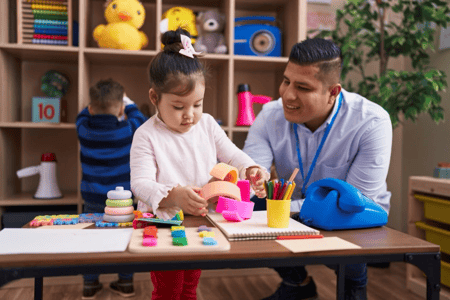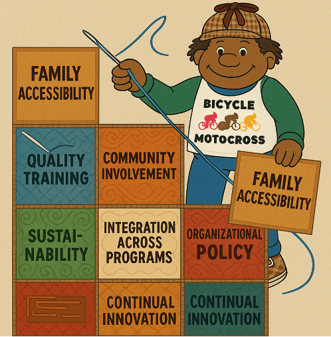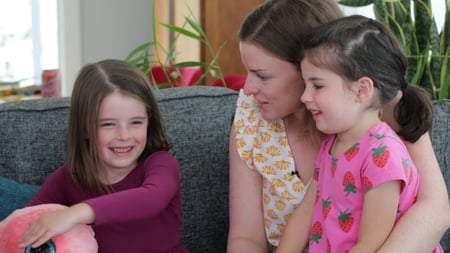How the Well-Baby Program Supports Healthy Child Development

Check out our blog for social-emotional learning articles, news, and more!

Positive reinforcement is vital to all children's healthy social and emotional development. Positive reinforcement is a part of creating a nurturing, supportive environment where young children are recognized for their positive behaviors, leading to better emotion regulation, social skills, and well-being. Effective, evidence-based early intervention for high-need children can capitalize on the benefits of positive reinforcement for children within this demographic.
The Incredible Years (IY) approach is grounded in these principles, providing structured, evidence-based early intervention programs that agencies and school districts can implement to support children, parents, and teachers alike.
Positive reinforcement is a powerful tool within evidence-based early intervention, especially for high-need children. Positive reinforcement involves recognizing, giving focused, positive attention to, and rewarding desired behaviors to encourage repetition. For young children, this could mean using age-appropriate, behavior-specific praise, visual reward systems, or celebrating developmental milestones—approaches that nurture a sense of achievement and encourage further growth. Age-appropriate positive reinforcement, like verbal praise or stickers, is particularly effective in capturing a young child's attention and reinforcing behaviors that support positive social and emotional development.
Positive reinforcement is essential for children with heightened risk factors, such as developmental delays or behavioral challenges. Evidence-based early intervention approaches help build strong foundations in attachment, social competence, and self-esteem. These frameworks support high-need children in overcoming challenges by focusing on their strengths and recognizing their efforts. This approach fosters motivation and resilience, which can be instrumental in bridging developmental gaps and promoting overall well-being.
Implementing positive reinforcement should be at the heart of evidence-based early intervention programs, especially for at-risk kids who may benefit most from a supportive, structured approach.
A key strategy involves consistent positive attention for positive child behaviors, including praise and encouragement, which means providing specific, immediate feedback on a child's effort and progress rather than just the outcomes. This approach helps children build confidence in their abilities and reinforces their dedication to learning new skills. Descriptive praise (like acknowledging a child's hard work on a task or their kindness toward a peer) encourages the behavior to continue and supports emotional and social development.
An effective reward system can also reinforce positive behaviors and build self-regulation skills. Developmentally appropriate reward charts or token systems (like sticker charts for younger children or tokens children can exchange for rewards) offer a visual and tangible way to track progress. Balancing tangible rewards, like small treats, with intangible ones, such as extra playtime, encourages children to associate their positive actions with immediate and long-term benefits. This balance helps children feel motivated and appreciated without relying solely on material rewards.
Fostering a growth mindset is another fundamental aspect of evidence-based early intervention. Teaching children to recognize and manage their emotions builds resilience and emotional awareness. Activities focusing on self-reflection, emotional literacy, and regulation can help young children learn to process their feelings constructively. These foundational skills, supported by positive reinforcement, play an essential role in guiding children toward healthier relationships and greater self-confidence as they navigate new challenges.
The Incredible Years approach begins with relationship-building and focuses on parents' and teachers' goals for children—positive behaviors that they would like to encourage in their children. Through strategies like play-based learning, parents and teachers learn how playtime with children can be a valuable opportunity to teach and model social skills and emotion regulation strategies. Parents and teachers are encouraged to give children lots of focused, positive attention when they are behaving well to help reinforce those behaviors, to catch children when they are being good, to look for positive behaviors to praise, and to use specific, labeled praise rather than a generic “good job.”
IY programs offer a comprehensive, evidence-based early intervention approach, empowering families, educators, and communities to create nurturing environments that support young children. IY helps build children's self-esteem, encourage positive behaviors, and foster early resilience by focusing on positive reinforcement strategies. In essence, the Incredible Years approach to positive reinforcement is about creating a nurturing, supportive environment where children are consistently recognized for their positive behaviors, leading to better emotional regulation, social skills, and overall well-being.
With targeted interventions designed for high-need and at-risk youth programs, IY's age-appropriate tools equip agencies to support parents, teachers, and children with practical, impactful strategies for their communities.
The IY Parent Training Programs are instrumental in teaching parents and caregivers how to use praise and positive reinforcement effectively within the family environment. These programs provide parents with techniques to acknowledge their children's efforts and progress, helping to create a positive home atmosphere that reinforces desired behaviors.
The Incredible Years parenting programs are tailored to the age range of the child, teaching parents and caregivers developmentally appropriate strategies for building positive, nurturing, supportive relationships with their children from birth to 12 years of age.
Through targeted strategies, parents learn to foster healthy family interactions, which can support emotional development and improve children's behavior. The program cultivates a home environment where children feel valued and understood by guiding parents to focus on their child's strengths and specific achievements.
For younger children aged 1 to 5, The Incredible Beginnings Program supports teachers and childcare providers in using positive reinforcement techniques tailored to this age group. The program focuses on early childhood development, incorporating play-based learning to engage children in positive social interactions.
Educators use praise and encouragement to help young children develop self-regulation, empathy, and social skills. This early, evidence-based intervention fosters emotional resilience and prepares children for future success.
For educators working with children aged 5-8 years, the IY Teacher Classroom Management Program offers tools and strategies to establish a positive classroom climate that encourages learning and personal growth. This program emphasizes positive reinforcement's power, using behavior-specific praise to motivate students and enhance their social and emotional skills. Teachers learn to create structured, supportive environments with clear expectations and developmentally appropriate rewards.
Through practical applications of positive reinforcement, teachers can help children build confidence, improve academic readiness, and strengthen peer relationships, especially in settings involving at-risk kids.
An essential component of the IY approach is the collaboration between parents and teachers, which ensures that positive reinforcement practices are consistent across home and school. IY programs emphasize the importance of coordinated efforts between caregivers and educators to create a seamless support system for children.
This consistency helps children feel secure and reinforces the skills they are learning in each environment, making positive behaviors more sustainable over time.
IY's child programs incorporate play-based positive reinforcement, which engages children in interactive learning while reinforcing social skills. Through guided play, children practice behaviors like sharing, listening, and empathy, with teachers and parents reinforcing these skills through specific praise and encouragement. This approach builds children's social competence and develops a love for learning in a supportive, engaging environment.
Incredible Years equips communities with the right tools to nurture resilient, confident children by blending evidence-based early intervention methods with positive reinforcement. IY's early intervention programs support high-need children by helping them build essential skills that serve as a foundation for future success.
When used as part of an evidence-based early intervention, positive reinforcement has a powerful impact on fostering resilience and positive growth in at-risk kids. Programs like Incredible Years offer childcare professionals and caregivers the tools to create nurturing environments that encourage children's development and support their long-term success. By reinforcing positive behaviors and building strong social-emotional skills, these strategies lay a foundation for children's well-being.
For professionals supporting at-risk kids, implementing an evidence-based early intervention program can help you empower and uplift the next generation.

Incredible Years provides evidence-based programs designed to aid early interventions for children in order to improve their emotional and social competencies, focusing on equipping parents, caregivers, and teachers with necessary strategies and support. Our unique approach is designed to address each child's individual needs and help them thrive for more information about our programs and how they can help you by visiting our Programs page.





